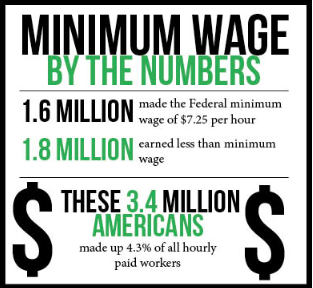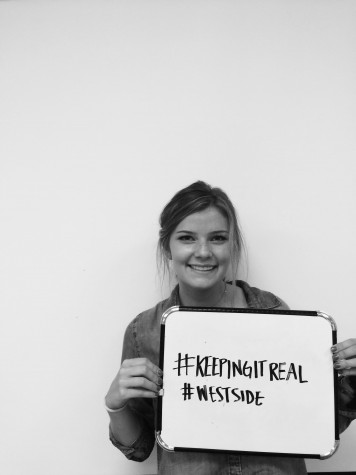Weekly debate: Minimum wage
Raising the minimum wage proves beneficial to workers
Anna Kreynin
Although teenagers can be content spending their hard-earned money on Free People sweaters and overpriced Starbucks drinks, surviving on the $7.25 minimum proves to be much more difficult. In fact, it is almost impossible. According to the Economic Policy Institute, “At the federal minimum wage of $7.25 per hour, working 40 hours per week, 52 weeks per year yields an annual income of only $15,080…This is below the federal poverty line for families of two or more.”
“Although it looks easy, cashiering is a grueling job,” Taylor James, junior and Metro Market employee, said. “You have to be physically fit to stay on your feet all day with minimal breaks. It’s ridiculous that hard working, full time employees that take no vacation time live have to live in poverty.”
Sen. Tom Harkin of Iowa and Rep. George Miller of California have suggested a minimum wage increase to $10.10 per hour, which would lift 900,000 families back above the poverty line, according to a report by the Congressional Budget Office.
By providing more money to families, these families are then able to put more money back into the economy, thus stimulating it. According to a study conducted by the Chicago Federal Reserve Bank, an raise in minimum wage would increase consumer spending. Every dollar increase in a minimum wage worker’s salary results in 2,800 additional dollars spent by his or her household over the upcoming year.
In addition, the Economic Policy Institute deemed that raising minimum wage to even $9.50 per hour would add $60 billion back into the economy.
While employees are doing their best to make their customers happy, an increase in minimum wage would likely boost their moods even more. The happiness of employees is an important matter, as happy employees result in a lower turnover rate, meaning they are less likely to quit. According to the Houston Chronicle, a low turnover rate results in lower recruiting costs, higher productivity, reduced administrative costs and lower operational costs.
It is apparent that an increase in minimum wage would benefit both the employees and the employers. For some hard working Americans, this increase is crucial. “An increase is not a luxury or ‘beer money’ anymore,” Jared Bernstein, economist at the Center on Budget and Policy Priorities and economic adviser to Vice President Joe Biden, said. “There are too many people who depend on a low-wage job to meet their family budget that this increase is needed, not wanted.”

Raising the minimum wage heightens unemployment
Molly Riebau
As a minimum wage worker myself, I would love to be making the proposed $10.10 an hour, but raising minimum wage is extremely detrimental to the American economy. According to the Bureau of Labor Statistics, “1.6 million [people] earned exactly the prevailing federal minimum wage of $7.25 per hour.”
Advocates of increasing the minimum wage vouch that low-skilled workers would be able support themselves if they were paid more. However, this proposition carries along long-term issues.
According to the article “The minimum wage delusion” by James Dorn, a raised minimum wage would create problems with the supply and demand of workers. Dorn asserted that “law tells us that quantity demanded (i.e., the number of jobs for low-skilled workers) will decrease more in the long run than in the short run, as employers switch to labor-saving methods of production—and unemployment will increase.” Unemployment of minimum wage earners will most dramatically hurt the lowest skilled workers.
As detailed by a recent Congressional Office report, U.S. employment could be reduced by 500,000 jobs.
Jonathan Meer, an assistant professor of economics at Texas A&M, agrees with the theory of unemployment increase due to increased minimum wage. In a study released in December 2013, Meer found that the effects of an increased minimum wage will “reduce net job growth, primarily through its effect on job creation.”
These job cuts primarily would affect the youngest workers. Therefore, my desire for more money could make me lose my after-school job. Meer said the effects of unemployment “are most pronounced for younger workers and in industries with a higher proportion of low-wage workers.”

Molly Riebau is the Editor-in-Chief of The Highlander Newsmagazine. Aside from journalism, she loves watching The Bachelor (more than any...

Mike Wezel • Oct 1, 2014 at 6:55 pm
Very informative article. Interesting debate on both sides of the issue.
Alicia Riebau • Sep 18, 2014 at 2:09 pm
Interesting article… I never took into consideration that raising the minimum wage could result in higher unemployment.